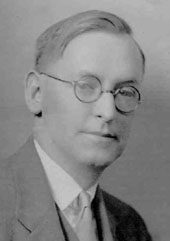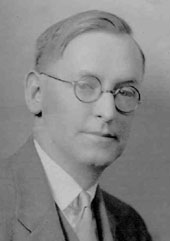
Alfred Storer Cole (October 9, 1893-January 5, 1977) was a minister, scholar, writer, librarian of the Universalist Historical Society and, for a quarter century, teacher of Homiletics and Unitarian Universalist history at the School of Religion of Tufts University.
The only son of Universalists Alfred and Mary Storer Cole, he was born in the rural town of Buckfield, Maine. His father, for 25 years Buckfield’s postmaster, was also town clerk, selectman, library trustee, historian and Sunday School superintendent at the Universalist society. Since the Universalist society closed in 1894, young Alfred was sent to the local Baptist church for religious training. Although the Baptists’ hellfire theology taught made no sense to him, he was drawn to the ministerial calling.
Young Alfred shared his father’s love of Buckfield and regularly walked its fields, hills, and woods. He shared, too, his father’s quiet personality and literary turn. He was also possessed of a lively sense of humor and a contagious friendliness. After graduation from high school in 1911, Alfred worked with his father at the post office until his father’s death in 1913.
In 1914 Cole entered the School of Religion of Tufts College. Clarence R. Skinner, the newly appointed Professor of Applied Christianity, became both his mentor and his lifelong friend. Cole took every course Skinner taught. “This teacher,” in the words of Cole’s biographer Nancy Benson, “gave direction to Alfred’s passion for the brotherhood of man and the power of religion to change human nature for the better.”
Cole graduated from Tufts in 1919 with a Bachelor of Sacred Theology degree, was ordained at the Universalist Church in Canton, Massachusetts and took up the pastorate of the All Souls Universalist Church in Portland, Maine. Two and a half years later he was called to the Universalist Church of West Somerville Massachusetts. Here he met Barbara Sawyer, a talented violinist who shared his love of nature, gardening and walking. Married in 1927, they had a daughter and a son.
In 1929 Cole was called to the federated Unitarian-Universalist Church of the Reconciliation in Utica, N.Y. From this time he was in dual fellowship with the Universalist Church of America (UCA) and the American Unitarian Association (AUA). His ministry at Utica was of short duration. In 1931 he became Assistant Professor of Homiletics at Tufts. He was also the stated supply at the Unitarian church in nearby Woburn, 1937-55.
In the 1930s and ’40s the Tufts School of Religion had an exceptionally able faculty. Besides Skinner and the Dean, Lee S. McCollester, the staff included John Ratcliff (religious education), Rolland Wolfe (Biblical studies), William Wyatt (Greek), Bruce Brotherson (philosophy) and Johannes A. C. Fagginger Auer (Church history and philosophy of religion). A symposium by these teachers, Tufts Papers in Religion, 1939, significantly shaped the theology of the Humiliati, a group of Universalist ministers who were (mostly) students at Tufts in the early ’40s. Cole’s years of working with the faculty and students at Tufts were his happiest and his most creative.
His homiletics course included sermon preparation and delivery, and also practice in the creation of wedding, child dedication and funeral/memorial services. In matters of ritual observance, Cole allowed great latitude. He encouraged students to make ample use of other than Biblical literature for opening and closing words, readings, prayers and meditations. He shared with students his own growing collection of new worship resources. Cole served on the Universalist Commission which published in 1937, jointly with a Unitarian commission, the widely used Hymns of the Spirit for Use in the Free Churches of America. When Carl Seaburg, a former student of Cole’s, published an anthology, Celebrating Christmas, he dedicated the volume to Alfred Cole, Kenneth Patton, Jacob Trapp and Vincent Silliman, because they had “greatly enriched our common worship.”
Cole also taught Unitarian and Universalist history. He wrote, with Skinner, the most recent biography of John Murray, Hell’s Ramparts Fell, 1941. He published Our Liberal Heritage, 1951. As teacher and librarian for the Universalist Historical Society, he helped students engage in research to lift up the shared Unitarian Universalist past. One such student, Ernest Cassara, later wrote the definitive biography of Hosea Ballou.
Cole and Skinner proved an effective teaching team. Many of the students were inspired by Skinner’s philosophy of religion and by his sincere commitment to social values and to pacifism. Yet he was aloof and hard to talk with. Cole was approachable, friendly and personally caring. They went to his office for conversation and counsel.

In 1954 the acting dean of the School of Religion cut Cole’s teaching load in half. Tufts administrators informed him that, notwithstanding his fine teaching record, he did not have appropriate degrees for the faculty of what was soon to become a professional graduate school. He would have no place in the new structure. At age 60 Cole set out to find a full time church position. With assistance from Thomas Sinclair, director of the Northern New England Region of Unitarian Churches, a former student, Cole was called to the Unitarian church in Lebanon, New Hampshire which he served from 1955-1966.
St. Lawrence University in 1964 awarded Cole an honorary Doctor of Divinity degree. At the urging of former students, the Universalist Historical Society published a collection of his worship materials, Give Me No Finished Chart, 1968, the title taken from his best known poem.
In retirement Alfred and Barbara lived in southern Vermont in a rough-cut log cabin, neighbors to their son Bruce and his family. Cole continued to do supply preaching and to officiate at weddings and memorial services. He was an Affiliated Minister with the Unitarian Universalist Church in West Brattleboro. Always he gardened and enjoyed walks with Barbara and visits from former students. He died in his sleep in 1977. His ashes are buried in the family plot at Buckfield in the shadow of Gardner’s Hill where he roamed as a boy.
The Alfred Storer Cole Papers, including the two pictures reproduced above, are in the Universalist Special Collections at Andover-Harvard Theological Library in Cambridge, Massachusetts. These include sermons, addresses, lectures (1930-1977), letters (1950-1976), and subject and biographical files. The Universalist Special Collections also has his correspondence with Alan Seaburg. Cole’s publications, aside from those mentioned above, include “What Worship Means to Me”, in Clarence Skinner et al, Tufts Papers in Religion (1939); “A Short History of Tufts College School of Religion, Medford, Mass.,” (typescript) (1947); Our Common Faith (1955); and Clarence R. Skinner, Prophet of Twentieth Century Universalism (1956). The only account of Cole’s life is Nancy Dollahite Benson, No Finished Chart: The Biography of a Liberal Minister (1984). Also helpful is Alfred Cole [the subject’s father] and Charles F. Whitman, A History of Buckfield, Oxford County, Maine (1915).
Article by Alan Seaburg
Posted February 12, 2003